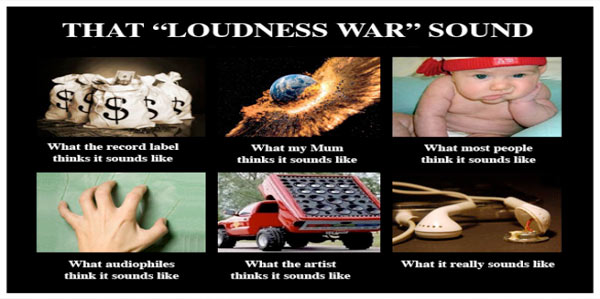Loudness and Normalization
This whole loudness war issue is still among the biggest issues confronting the music industry today. And it includes to impact those of us in the business making recordings, those offering services for those making and releasing records, those distributing music via the web, files, or discs, and of course, end consumers. Things are changing. Some contend that the “loudness wars” are coming to an end…or at least…that there’s been an improvement in the fidelity of commercial releases. I wrote about Ian Shepherd’s post the other day and was critical of his assessment that “YouTube just put the final nail in the Loudness War’s coffin”. I disagreed. Ian wrote a couple of comments on my page that I wanted to include in a post. It’s important that his point of view be clearly made. He wrote:
“What I’m saying is – when songs are loudness-matched, the ones with balanced, powerful dynamics will sound *better* than the ones that have simply been smashed in the old loudness-war style.
And by the way, that’s what I mean when I say “move your masters from puny to powerful” on my site – powerful doesn’t mean loud. Mastering makes songs louder than the mixes often, yes – but only when it serves the music, when I do it. Music can’t sound powerful without dynamics, that’s the point. Ask any of the hundreds of people who’ve taken my course – for me, it’s all about finding the “sweet spot”, not making something loud for its own sake.”
He continued:
“Your suggestion that I’m ‘part of the problem’ baffles me – I regularly turn down work from people who want me to make masters louder than I think is good for the music. I founded Dynamic Range Day to raise awareness of this issue, and I developed my Perception plugin to help people clearly hear the effects of excessive loudness processing and find a better, balanced solution instead.
Anyway, back to my main point – my argument is, when music is loudness-normalised as YouTube have just done, the horrible crushed sound of most current releases won’t make them stand out any more.
My belief and hope is that over time, the ‘loudness addicted’ industry and engineers you talked about will realise this, and simply stop doing it. And as a result, music will sound better, and we’ll all benefit.”
My comment about Ian being part of the problem was not meant as an attack on him specifically…but rather on the mastering profession in general (I was part of that community for 13 years…I get it). I’m impressed if Ian can convince artists, producers, labels, and management to avoid the overdone compression and limiting of commercial tracks. My last mastering gig for Paul Rogers of Bad Company fame was the last straw for me…the label insisted that I make the project louder five times. I had Paul in the room with me during most of the work (which was unusual and a real treat…he’s a very nice guy). Talk about artist’s intent! He was thrilled at what we had done the first time but the label people weren’t. Guess who won that war? The label, of course.
And they continue to win. If you were given the choice of releasing your record without mastering, what do you think you would do? One listen to the loud version vs. the normal version and you’d get with the program. It is the music business after all.
I’ll write about this new area of normalization in a future post. Is it a positive step away from the loudness wars? I don’t personally think so. The mainstream business is not going to change their position that “loud is always better”. There’s growing awareness of the problem…but I haven’t personally seen any signs that things are improving. The artists aren’t even aware of it from what I’ve seen.


In elucidating the differences between loudness normalization and peak normalization, you may find this document helpful:
https://tech.ebu.ch/files/live/sites/tech/files/shared/techreview/trev_2010-Q3_loudness_Camerer.pdf
Thanks Andrea…it looks to be an excellent read. I’m not sure it will change the habits of music producers and mastering professionals, but at least broadcasts will be leveled.
Why can everyone have their cake and eat it too?
We are in 2015, digital downloads and streaming are in and physical media is going out. Why not just make a non Mastered Album? From that Master you can have all flavors of audio quality and formats you want.
1. Pure Audiophile Grade
2. Super Compressed for portables
3. A 130db hot version for deaf people
4. DSD, DXD, Flac, MP3, etc, etc, etc..
We all can win.
Mark, have you watch any of Ian’s Dynamic Range Day presentations on Google+? I sat through the one last year.
I agree with offering several versions. The biggest issue where it makes any sense is listening over car systems and over ear phones off your smart phone when out and about. To me the solution could be simple. Offer the finest version you can without loudness considerations. Have all the normal playback equipment offer two or three levels of compression which can be switched on or off. Select what makes it all clear to you in the car, leave it off when at home or quiet places. Have your cake and eat it too.
Yeah, I know, good luck with making that become the standard.